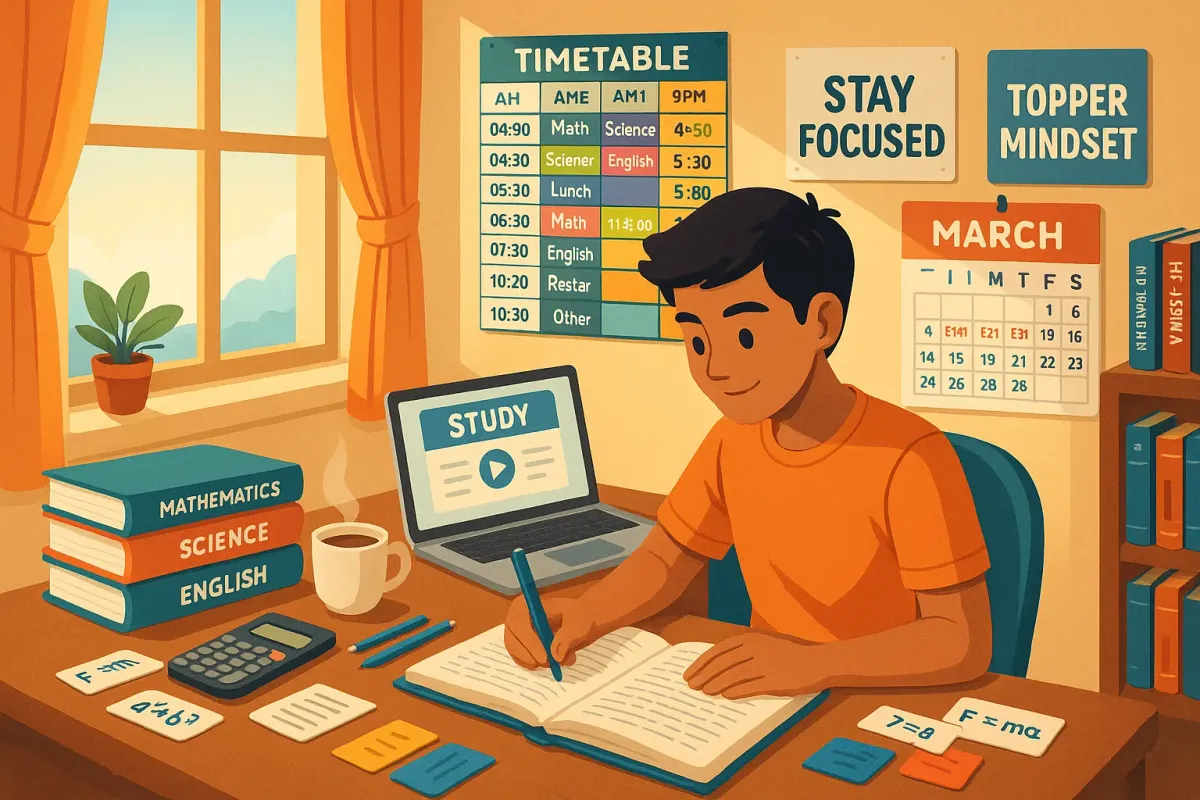Topper’s Study Plan for Class 10th and 12th Board Exams
This study plan is designed for students aiming to achieve top ranks in CBSE (or similar board) Class 10th and 12th exams.

This study plan is designed for students aiming to achieve top ranks in CBSE (or similar board) Class 10th and 12th exams. It incorporates strategies used by toppers, balancing syllabus coverage, revision, practice, and well-being. The plan is structured for 6–8 months of preparation, assuming exams are in March 2026.
💡
"Adjust this timetable based on your needs and schedule."
General Principles for Toppers
- Syllabus Mastery: Download the latest CBSE syllabus from cbse.nic.in. Prioritize high-weightage topics (e.g., 70% of questions come from 50% of the syllabus).
- Time Management: Allocate 6–8 hours daily for Class 10 and 8–10 hours for Class 12, including school/coaching, with breaks every 50–60 minutes.
- Consistency Over Cramming: Study daily to build retention; avoid long, unproductive sessions.
- Smart Study: Focus on NCERT textbooks (core for CBSE), solve past 5–10 years’ board papers, and use reference books selectively.
- Health and Balance: Sleep 6–7 hours, exercise 20–30 minutes daily, and eat nutritious meals to maintain focus.
- Track Progress: Maintain a notebook to log study hours, topics covered, and mock test scores.
Daily Study Plan
Total Study Hours:
- Class 10: 6–8 hours (including school/coaching).
- Class 12: 8–10 hours (including school/coaching).
Morning (4:00 AM – 8:00 AM)
- 4:00–4:15 AM: Wake up, hydrate, and do light stretching to boost alertness.
- 4:15–5:45 AM (1.5 Hours):
- Class 10: Math (solve 10–15 problems from NCERT/RD Sharma on Algebra, Geometry, or Trigonometry) or Science (Physics numericals, Chemistry equations, Biology diagrams).
- Class 12: Core subject (e.g., Math: Calculus; Physics: Electrostatics; Chemistry: Organic reactions; Economics: Macro concepts).
- Focus: Solve NCERT examples and 5–10 exercise questions.
- 5:45–6:15 AM (30 Minutes): Revise formulas, key concepts, or diagrams from the previous day. Use flashcards for quick recall (e.g., Math formulas, Chemistry reactions).
- 6:15–7:00 AM: Breakfast, light walk, or meditation to refresh.
- 7:00–8:00 AM: Prepare for school/coaching, review notes, or solve 5 quick MCQs.
Mid-Morning (8:30 AM – 12:30 PM)
- 8:30 AM–12:30 PM: Attend school/coaching actively. Take detailed notes, ask doubts immediately, and highlight key points from teachers.
- 12:30–1:00 PM (30 Minutes): Post-school review of class notes; summarize key concepts in your own words.
- 1:00–2:00 PM (1 Hour):
- Class 10: Study Social Science (History timelines, Civics concepts, Geography maps) or English (literature chapters, grammar rules).
- Class 12: Study a theory-heavy subject (e.g., Biology: Human Physiology; History: Modern India; Economics: National Income).
- Task: Make concise notes (1–2 pages per chapter) for quick revision.
Afternoon (2:00 PM – 5:00 PM)
- 2:00–3:00 PM: Lunch and rest (include a 15–20 minute power nap if needed).
- 3:00–4:30 PM (1.5 Hours):
- Class 10: Focus on weak areas (e.g., Hindi grammar, Science numericals, or Social Science dates). Solve 5–10 questions from sample papers.
- Class 12: Tackle challenging topics (e.g., Math: Coordinate Geometry; Physics: Mechanics; Accountancy: Cash Flow Statements).
- Use reference books: RD Sharma (Math), HC Verma (Physics), TS Grewal (Accountancy).
- 4:30–5:00 PM: Practice writing answers for languages (essays, letters) or Social Science/Humanities (long answers) to improve presentation and speed.
Evening (5:00 PM – 8:00 PM)
- 5:00–7:00 PM (2 Hours):
- Class 10: Alternate between Math (10 problems), Science (diagrams/numericals), and Social Science (map work, key points).
- Class 12: Focus on practical subjects (Physics/Chemistry practicals, Computer Science programs) or solve numericals/theory questions.
- Task: Solve 1–2 previous year board questions per subject.
- 7:00–8:00 PM: Group study (optional, once a week). Discuss concepts with peers to reinforce understanding or teach a topic to solidify your knowledge.
Night (8:30 PM – 10:30/11:00 PM)
- 8:30–10:00 PM (1.5 Hours):
- Class 10: Study English (read literature, practice comprehension) or Hindi (unseen passages, grammar). Revise the Social Science key points.
- Class 12: Revise formulas (Math/Physics), reactions (Chemistry), or key concepts (Economics/History). Solve 5–10 short-answer questions.
- 10:00–10:30 PM (30 Minutes): Solve a sample paper (1–2 times a week) under timed conditions or revise notes made during the day.
- 10:30–10:45 PM: Plan the next day’s schedule. List 3–5 priority topics and resources needed.
- 10:45 PM: Sleep to ensure 6–7 hours of rest.
Weekly Study Plan
- Monday–Friday: Follow the daily plan, covering all subjects (2–3 subjects daily).
- Saturday:
- Morning (3 Hours): Full-length mock test for one subject (e.g., Math, Science, or Physics).
- Afternoon (2 Hours): Analyze mistakes, rework incorrect answers, and note common errors.
- Evening (2 Hours): Revise weak topics or complete pending assignments.
- Sunday:
- Morning (2 Hours): Revise notes for all subjects; focus on formulas, diagrams, and key points.
- Afternoon (3 Hours): Solve past 5 years’ board papers or Oswaal/Arihant sample papers.
- Evening (1–2 Hours): Light study (languages, theory revision) or relax to avoid burnout.
- Plan Next Week: List topics, mock tests, and goals for the upcoming week.
Monthly Study Plan
- August–November 2025 (Syllabus Completion):
- Complete 80–100% of the syllabus by November.
- Class 10: Cover 2–3 chapters per subject monthly.
- Class 12: Cover 3–4 chapters per subject monthly, focusing on high-weightage topics.
- Task: Solve NCERT exercises and 1 sample paper per subject.
- December 2025 (1st Revision):
- Revise the entire syllabus, focusing on weak areas.
- Solve 2–3 sample papers per subject.
- Make short notes (1–2 pages per chapter) for quick recall.
- January 2026 (2nd Revision):
- Focus on answer presentation, time management, and board question patterns.
- Solve 3–5 past board papers per subject.
- Practice writing answers within word/time limits.
- February 2026 (3rd Revision):
- Quick revision using notes, flashcards, and mind maps.
- Take 1–2 full-length mock tests weekly under exam conditions.
- Revise formulas, diagrams, and key points daily.
- March 2026 (Pre-Exam):
- Light revision, focus on high-weightage topics.
- Avoid new topics; consolidate what you know.
- Take 1 mock test per subject 1–2 weeks before exams.
Subject-Specific Strategies
Class 10
- Mathematics:
- Science:
- Resources: NCERT, S. Chand (reference).
- Physics: Solve numericals (e.g., Electricity, Light).
- Chemistry: Memorize reactions (e.g., Acids, Bases).
- Biology: Practice diagrams (e.g., Heart, Nephron) and processes.
- Task: Solve 10 NCERT questions + 5 sample paper questions daily.
- Social Science:
- Resources: NCERT, Oswaal Question Bank.
- History: Memorize dates, events (e.g., Nationalism in India).
- Geography: Practice map work (10–15 marks in exams).
- Civics/Economics: Focus on key terms, concepts.
- Task: Make timelines, solve 5–10 questions daily.
- English:
- Resources: NCERT (First Flight, Footprints Without Feet).
- Focus: Literature themes, grammar (tenses, modals), writing (letters, essays).
- Task: Practice 1 writing task daily, read 1 chapter, solve 5 grammar questions.
- Hindi/Sanskrit:
- Resources: NCERT, Kshitij/Kritika (Hindi).
- Focus: Grammar, unseen passages, writing (essays, letters).
- Task: Practice 1 passage and 1 writing task daily.
Class 12 (Science, Commerce, Arts)
- Physics:
- Chemistry:
- Resources: NCERT, OP Tandon (reference).
- Organic: Memorize reactions, mechanisms (e.g., Aldehydes, Ketones).
- Physical: Solve numericals (e.g., Solutions, Electrochemistry).
- Inorganic: Revise NCERT thoroughly (p-block, d-block).
- Task: Solve 10 questions daily, revise 1 chapter.
- Mathematics:
- Resources: NCERT, RD Sharma, R.S. Aggarwal.
- Focus: Calculus (35%), Vectors/3D (15%), Probability (10%).
- Task: Solve 15–20 problems daily, focus on NCERT exemplars.
- Biology:
- Resources: NCERT, Trueman’s Biology.
- Focus: Human Physiology (20%), Genetics (15%), Ecology (15%).
- Task: Practice diagrams, solve 10 NCERT questions daily.
- Accountancy (Commerce):
- Resources: NCERT, TS Grewal.
- Focus: Financial Statements (20%), Partnership (15%).
- Task: Solve 5–10 practical problems daily.
- Economics (Commerce/Arts):
- Resources: NCERT, Sandeep Garg.
- Focus: Macro (National Income, Money), Micro (Demand, Supply).
- Task: Make flowcharts, solve 5–10 questions daily.
- History (Arts):
- Resources: NCERT, Themes in Indian History.
- Focus: Modern India, World History.
- Task: Make timelines, practice 2–3 long answers daily.
- English:
- Resources: NCERT (Flamingo, Vistas), Physics Wallah
- Focus: Literature (themes, character sketches), writing (articles, reports).
- Task: Practice 1 writing task, read 1 chapter daily.
Topper’s Habits
- NCERT as Bible: 90% of CBSE questions are from NCERT. Read, underline, and solve all exercises.
- Past Papers: Solve 5–10 years’ board papers to understand question patterns and weightage.
- Short Notes: Create 1–2 page notes per chapter with formulas, diagrams, and key points.
- Time-Bound Practice: Simulate exam conditions (3 hours, no distractions) to build speed and accuracy.
- Doubt Resolution: Clear doubts same-day via teachers, peers, or online platforms (e.g., Doubtnut, Physics Wallah).
- Avoid Distractions: Limit phone use to 30–60 minutes daily. Use apps like Forest or Focus@Will.
- Answer Presentation: Use headings, bullet points, and diagrams in answers to score higher.
Resources
- Class 10 books for exam preparation:
- Math: NCERT, RD Sharma, Oswaal Sample Papers.
- Science: NCERT, S. Chand, Arihant All-in-One.
- Social Science: NCERT, Oswaal Question Bank.
- English/Hindi: NCERT, Together With.
- Class 12 books for exam preparation:
- Physics: NCERT, HC Verma, DC Pandey.
- Chemistry: NCERT, OP Tandon, Arihant.
- Math: NCERT, RD Sharma, R.S. Aggarwal.
- Biology: NCERT, Trueman’s, MTG.
- Commerce: NCERT, TS Grewal, Sandeep Garg.
- Arts: NCERT, Oswaal Sample Papers.
- Online Resources:
- YouTube: Physics Wallah, Unacademy, Vedantu.
- Apps: BYJU’S , NCERT Solutions.
- Websites: cbse.nic.in, mycbseguide.com.
Sample Daily Timetable
| Time | Class 10 Activity | Class 12 Activity |
|---|---|---|
| 4:00–5:45 AM | Math (10–15 problems) | Math/Physics (Numericals/Derivations) |
| 5:45–6:15 AM | Science (Revise formulas/diagrams) | Chemistry (Reactions/Revision) |
| 6:15–8:00 AM | Breakfast + School Prep | Breakfast + School Prep |
| 8:30 AM–12:30 PM | School + Social Science/English | School + Biology/Economics |
| 12:30–2:00 PM | Notes Review + Social Science/English | Notes Review + Biology/Economics |
| 2:00–3:00 PM | Lunch + Rest | Lunch + Rest |
| 3:00–4:30 PM | Weak Subject (Hindi/Science) | Weak Subject (History/Accountancy) |
| 4:30–5:00 PM | Writing Practice (Languages/Social) | Writing Practice (Languages/Humanities) |
| 5:00–7:00 PM | Math + Science (Diagrams/Numericals) | Physics/Chemistry (Practicals/Numericals) |
| 7:00–8:00 PM | Social Science (Map Work) | Math/Humanities (Answer Writing) |
| 8:30–10:00 PM | English/Hindi + Revision | English + Revision |
| 10:00–10:30 PM | Sample Paper/Notes Revision | Sample Paper/Notes Revision |
| 10:30–10:45 PM | Plan Next Day | Plan Next Day |
| 10:45 PM | Sleep | Sleep |
Additional Tips
- If you're looking for personal guidance, let us know.
This plan, followed diligently, will help you achieve top scores. Stay focused, stay healthy, and good luck!
Join our WhatsApp community for the latest updates.
SchoolOkay | WhatsApp Channel
SchoolOkay WhatsApp Channel. It’s a channel for sharing educational content. 0 followers

Thanks, and share.





Comments ()